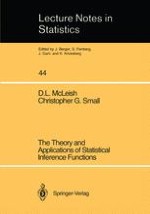
1988 | OriginalPaper | Buchkapitel
Inference for Stochastic Processes
verfasst von : D. L. McLeish, Christopher G. Small
Erschienen in: The Theory and Applications of Statistical Inference Functions
Verlag: Springer New York
Aktivieren Sie unsere intelligente Suche, um passende Fachinhalte oder Patente zu finden.
Wählen Sie Textabschnitte aus um mit Künstlicher Intelligenz passenden Patente zu finden. powered by
Markieren Sie Textabschnitte, um KI-gestützt weitere passende Inhalte zu finden. powered by
Likelihood methodology is justifiable on a discrete probability space line by a simple intuitive interpretation of likelihoods. For example, in a discrete probability space, the maximum likelihood estimator is that value of the parameter that would render the probability of the data maximum. However, when our observations are realized in a more complicated space, the intuitive argument for likelihood methodology is more difficult. In the case of models for continuous time stochastic processes there is often no single dominating measure on a sample space of paths that is analogous to Lebesgue measure for continuous random variables. Thus maximum likelihood estimates cannot be generally computed by maximizing over a convenient likelihood function. This leads to difficulties both in computation and in stability of the procedure as we shall now discuss. Consider for example a Wiener process Xt with zero drift and diffusion parameter σ. Suppose we wish to estimate σ based upon a single realization of the process from time t=0 to time t=T>0. Now the induced probability measures on the space of paths for two distinct values of σ are orthogonal. Therefore likelihood methodology suggests that from a single realization of the process the value of σ can be determined precisely. However, there is a continuity problem here that cannot be easily removed. In practice, it is impossible to make an infinitely precise measurement and so we must allow for the fact that the process actually recorded is a combination of Xt and an error et. For example, the combined process, Xt+et might be a rounded version of the original Wiener process. However, it can be seen that within any such error neighborhood of Xt lie paths which are not in the support of the Wiener measure.